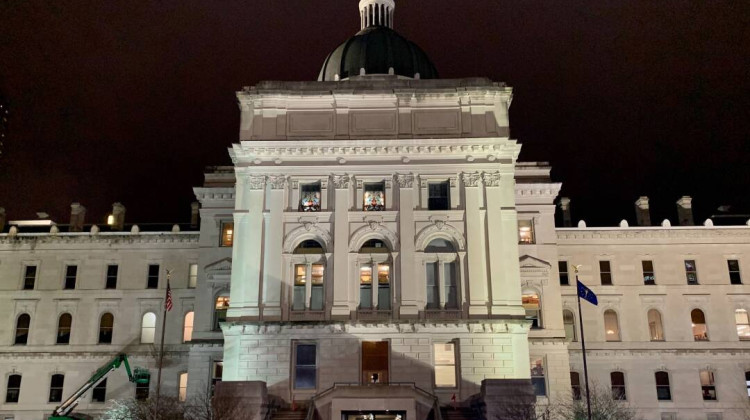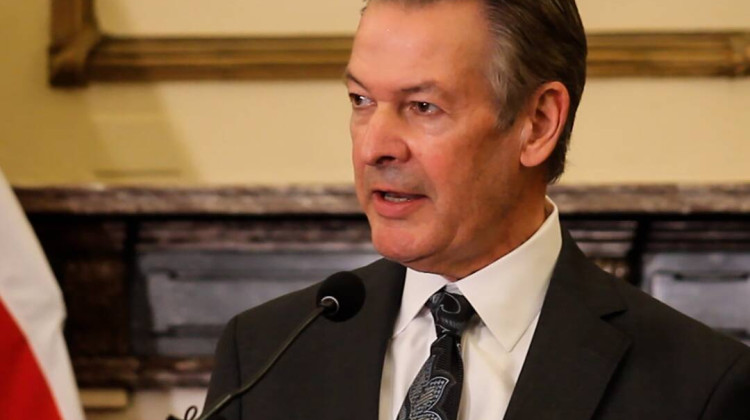
Major General R. Dale Lyles (right) and Col. Tim Baldwin (left) testify before the Senate Committee on Veterans Affairs and The Military.
Screenshot of Senate committee livestreamIndiana National Guard leaders have told lawmakers since January they are “not able” to convene general courts-martial to address the “most serious” cases of misconduct within the Guard, including four sexual assaults last year.
They have pointed to an issue in the governor’s exclusive power to convene a general court-martial. However, the governor has not received a call to convene one since taking office in 2017, according to spokespeople for both the governor’s office and the Guard.
Under current law, the power to convene general courts-martial is exclusive to the governor, following a request by the Guard. Guard leaders are asking lawmakers to pass a law that would allow the adjutant general, the Guard’s highest-ranking leader, to convene them as well.
“Sexual assault is not being punished to the fullest extent because of my inability to convene these court-martials,” said Major General R. Dale Lyles, the adjutant general.
Guard leaders didn’t provide a clear reason those sexual assaults weren’t handled by a general court-martial, as they told lawmakers such cases “absolutely” should be. The issue, they repeatedly suggested, comes down to who has the power to convene a general court-martial.
In an email to Indiana Public Broadcasting, a spokesperson for the governor’s office said Gov. Eric Holcomb has not received a call to convene a court-martial from the state’s National Guard since taking office in 2017. In a statement, the Guard confirmed that’s true. The governor can only convene after receiving a call to do so.
An Indiana Public Broadcasting review of hours of testimony and debate on the proposed law shows Guard leaders and the bill’s sponsors never explicitly told lawmakers that was the case and frequently suggested there was an issue with the governor’s office.
“[House Bill 1076] allows the adjutant general to convene a court-martial, in addition to the governor,” Rep. Chris Jeter (R-Fishers), the bill’s author, said on the House floor on Jan. 23. “Under current law, only the governor can. That has proven to be really difficult logistically for the National Guard.”
Jeter, who has experience as a military lawyer, had previously said that he worked closely with Guard leaders on this bill. A Guard spokesperson declined our request to explain what “proven” difficulties they’ve faced if there hasn’t even been an attempt to get the governor to convene anything.
They also declined to explain why they didn’t attempt to call for the governor to convene a court-martial in those four sexual assaults last year. The governor’s office also didn’t comment on whether not calling for a court-martial in those cases was appropriate in time for publication.
There may be a strong reason Guard leaders believe they can’t or shouldn’t bring these cases to the governor, but spokespeople for both declined to provide any such explanation.
Join the conversation and sign up for the Indiana Two-Way. Text "Indiana" to 73224. Your comments and questions in response to our weekly text help us find the answers you need on statewide issues throughout the legislative session. And follow along with our bill tracker.
The accused in those four sexual assault cases last year were removed from the Guard’s ranks, officials said, but did not receive a dishonorable discharge or any other punishment because they weren’t court-martialed. They were referred for civilian prosecution, but county prosecutors declined to move those cases forward “for various reasons.”
“So we are allowing people to leave the organization after being found guilty for these things with what I would describe as a mild or less-than-favorable punishment,” said Adjutant General Lyles.
What the Guard said
While representatives of the Indiana National Guard never explicitly told lawmakers that the governor was unable or unwilling to convene general courts-martial, several bits of testimony implied that responsibility for the lack of convenings in recent years was on the governor’s office.
For example, Sen. J.D. Ford (D-Indianapolis) asked why courts-martial haven’t been called during a Senate hearing on Jan. 24.
“The burden that it places on the governor could be such that pushing it to that level would make it more complicated and lessen our ability to affect the (sic) justice,” said Adjutant General Lyles.
Lyles did later clarify that the responsibility for calling for the governor to convene falls to the adjutant general. But he did not explicitly state that no calls had been made.
In a Jan. 11 House committee hearing, Rep. Becky Cash (R-Zionsville) asked Guard representatives if “because you're having to go through the governor” they weren’t able to properly punish “horrible crimes.”
She ended her question with, “I think that's what I'm understanding is happening here, with all due respect to the governor, it's taking you guys too long to be able to do this, correct?”
“Yes, ma'am,” said Tim Baldwin, National Guard colonel and staff judge advocate. “Sexual assaults occur in the National Guard. We had two last year, we were not able to go to a general court-martial, which would have allowed us to get a dishonorable discharge.”
Baldwin originally said there were two sexual assault cases last year. He later told lawmakers there were four and the Guard confirmed to Indiana Public Broadcasting that is the accurate number.
“As currently situated, we cannot do a general court-martial for a sexual assault committed by a soldier without the governor convening a general court-martial,” Baldwin said earlier in that Jan. 11 committee hearing. “If [the adjutant general] is allowed to convene a general court-martial, then we can address these sexual assaults right now. We're limited to separation boards, we separate them from the army, they get a bad characterization of discharge. But that's not commensurate with the level of the offense.”
Some supporters of the bill have suggested there’s an issue with the governor's ability to efficiently review and respond to court-martial calls and expressed concerns about the governor’s involvement making the process “political.”
“I hope you appreciate the governor's probably not and shouldn't be involved in that kind of day-to-day operations,” said Sen. Aaron Freeman (R-Indianapolis), the bill’s Senate sponsor, during a March 7 hearing. “The commanding officer should be and General Lyles should be, and they need to have good order and discipline in their ranks. And that's what this bill does.”
No one from the governor’s office testified on the bill during hearings.
“It’s concerning”
The takeaway from such testimony, for some observers, is that the governor is failing to take action on criminal acts in the Guard.
“If the governor is not convening court-martials for sexual assault, then let's have that conversation,” said Rebecca Rudolph, a U.S. Navy veteran and sexual assault survivor. She testified against the bill last week.
Lisa Wilken is a U.S. Air Force veteran, member of the Indiana American Legion legislative team, and sexual assault survivor. She and the Legion oppose the proposed law because of a separate but related provision dealing with non-judicial punishments.
However, the Legion previously said it supports the part that would give the adjutant general convening power.
“It's our understanding that, currently per the Indiana code, only the governor can convene a general court-martial. And so the governor has not been convened in court-martials,” Wilken said in an interview Monday.
She said the Legion has been asking the Indiana National Guard about how many calls to convene have been sent to the governor and what his responses have been but “received no answer.”
She said she was “surprised” when Indiana Public Broadcasting informed her that the governor has not gotten a call to convene since 2017.
“It's concerning. But it's actually also relieving to know that our governor hasn't been presented with information where a court-martial could be convened, and they didn't respond,” Wilken said. “That didn't line up with what we know out of this governor. So that makes me feel a little bit better in that respect, but it raises the concern in regards to this bill.”
Wilken said it is hard to judge whether the Guard did the right thing in not calling to convene those four sexual assault cases last year without knowing the specifics of each case.
“If a court-martial needs to be convened for sexual assault, though, that should have been sent to the governor. Giving the adjutant general the authority to convene a court-martial wouldn't have changed those circumstances,” Wilken said. “The testimony we heard making those statements that they would have liked to have been able to have convened a general court-martial hearing that they didn't even request one is very concerning, because they're perpetuating passing this bill on misinformation and using a very difficult topic for people to speak about.”
The Guard spokesperson declined to comment on whether leaders’ testimony and omission of the fact that the governor never received calls to convene misled people into believing the governor is blocking the Guard from “addressing these sexual assaults.”
HB 1076 is up for a second reading in the Senate Monday. If no changes are made, it could be on track to head to the governor’s desk as soon as Tuesday.
Adam is our labor and employment reporter. Contact him at arayes@wvpe.org or follow him on Twitter at @arayesIPB.
 DONATE
DONATE








 Support WFYI. We can't do it without you.
Support WFYI. We can't do it without you.